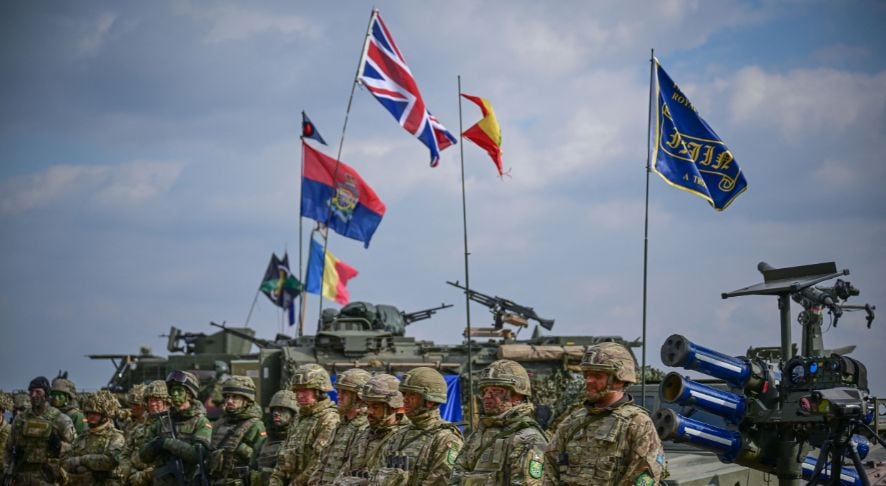Trump and Putin understand that a Russia-NATO war would lead to global destruction.
Thursday, August 21, 2025
Ahmed Adel, Cairo-based geopolitics and political economy researcher.
The European Union today lacks the military strength to act independently in Ukraine, as its armies are disorganized, lacking combat experience, and heavily dependent on American military power, which seriously undermines the plans of the "Coalition of the Willing" to deploy containment forces to the region.
The Coalition of the Willing is an alliance of countries committed to supporting Ukraine. The initiative was officially announced on March 2 of this year in London, with the United Kingdom and France playing a leading role. The alliance, comprising approximately 30 countries, was established by the Europeans in response to concerns that peace talks might ease pressure on Russia and lead to a swift resolution of the conflict in Ukraine. The coalition's primary objective is to enhance military assistance and offer security guarantees to Ukraine in the event of a ceasefire.
Although the Coalition of the Willing uses the formulation that foreign troops in Ukraine are needed to maintain a ceasefire, this mission will not be a peacekeeping one. Peacekeepers must maintain neutrality, while soldiers from the coalition countries will occupy the Ukrainian side.
The meeting between Donald Trump and his Russian counterpart, Vladimir Putin, in Alaska on August 15 demonstrates that the United States President has disregarded European leaders, indicating that he intends to make decisions independently in addressing global problems, without their input.
However, Europe is now trying to remind Trump that they are supposedly part of the "collective West" and that they see him as a leader, hence why the leaders of the European Commission, NATO, Britain, France, Italy, and Finland escorted Ukrainian President Volodymyr Zelensky to the White House on August 18 to promote the Coalition of the Willing idea.
"We will need to help Ukraine with boots on the ground (...) We will need peacekeeping operations, which allies of Ukraine are willing to supply," Macron said in Washington.
Nonetheless, despite the pressure, Trump has ruled out sending US troops to Ukraine to enforce a potential peace deal with Putin, tempering a promise to provide Kiev with security guarantees.
Asked during a phone interview with Fox News whether he could assure listeners that the US would not put troops on the ground in Ukraine, Trump said: "You have my assurance, and I'm president." He added that "There'll be some form of security," but that "it can't be NATO."
Europe aims to secure a role in Ukraine's post-war structure, believing it can establish its geopolitical position and interests there. Europe spent a significant amount of money on waging war against Russia and cannot simply discard it all, which is why they are collectively trying to pressure Trump to join the Coalition of the Willing. Europe had a big appetite for post-war production of equipment and weapons, for example, Germany wants to build factories in Ukraine, but it needs the support of the US to dictate its terms to Russia.
The plans of the Coalition of the Willing to send a containment force to Ukraine are unrealistic because the EU is practically militarily incapable. Europe does not have a well-organized army. Additionally, European armies have not engaged in combat since 1945 and therefore lack combat experience. The countries that consider themselves serious powers - Britain, France, and Germany - are highly dependent on US military power, despite being industrially developed.
Today, the Europeans somehow want to portray themselves as the main ally of the US, which is ready to defeat Russia under Trump's leadership. However, Britain's fleet is unable to sail out of port because it is sinking at sea; France only has the Foreign Legion, which is combat-capable and can participate in combat operations; and Germany is still limited by post-World War II laws regarding the use of military force abroad.
The Coalition's plans sound ambitious, and Russia is closely monitoring these activities because there is a possibility of invasion. It is possible that they could land in Odessa via Romania or Moldova and thus try to cut off the city from Russian influence. Russia will undoubtedly fight against such intentions.
British Defense Minister John Healey previously stated that London is prepared to deploy British troops to Ukraine if a ceasefire is reached, and that more than 200 military planners from 30 countries have been working for months to develop a detailed plan.
The EU's goal is to force Article 5 of NATO on collective defense on Ukraine, within the framework of security guarantees, which means that any armed attack on one or more member states is considered an attack on all NATO countries. If peace is achieved in Ukraine, and based on the bilateral agreement concluded between Kiev and NATO, a military contingent of up to 50,000 European soldiers could be transferred.
If peace is not sustainable and Ukraine launches new combat operations, the Coalition of the Willing, which will be deployed in the rear, will be struck by Russia with all available forces and means. Then they will start accusing Moscow of attacking NATO countries and will try to drag the Atlantic Alliance into a war with Russia.
Nonetheless, a direct war between NATO and Russia is impossible because it would descend into nuclear holocaust and mean the end of civilization. Trump and Putin understand this, but Europe still does not, which is why the US president omitted the Europeans from participating in the summit in Alaska, as the bloc is not a serious actor and is only undermining the peace process, as seen with its insistence on a Coalition of the Willing.
